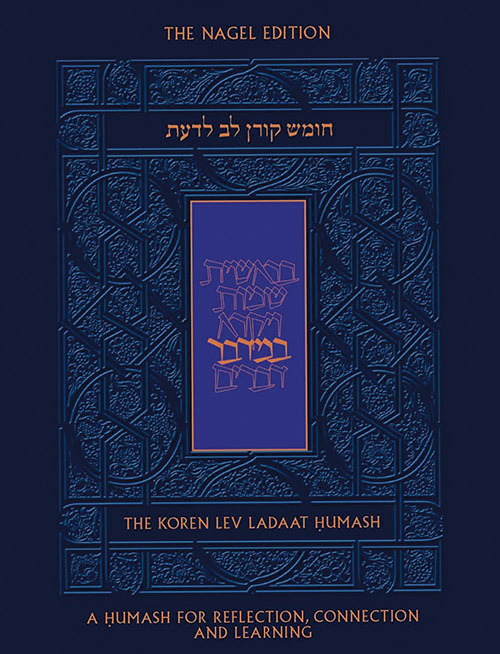
Reviewing: “The Koren Tanakh of the Land of Israel: Numbers” by Jonathan Sacks. Koren Publishers Jerusalem. 2023. English, Hebrew. Hardcover. 338 pages. ISBN-13: 978-9657766729.
As I wrote in my review of ”The Koren Tanakh of the Land of Israel: Exodus,” context is vital when it comes to an understanding of a subject. If someone lacks context, their ability to understand is severely limited. For example, the late Professor Yaakov Elman of Yeshiva University produced a series of studies that considered the impact of Persian culture on the Babylonian Talmud (Bavli). Elman created the academic field known as Talmudo-Iranica, which seeks to understand the Bavli in its Middle-Persian context. Anyone who studies the Bavli and wants to understand the bigger picture of the text and context will indeed find Elman’s writings an invaluable reference.
In ”The Koren Tanakh of the Land of Israel: Numbers,” editor-in-chief David Arnovitz continues the extraordinary work in this third volume of the Chumash series, which brilliantly explains the stories in the context of the milieu in which they took place. This commentary does an excellent job of exploring and explaining the Near Eastern context of the stories and narratives here.
In its early days, Judaism was a radical departure from other cultures. Much of the commentary here compares and contrasts Israel with the other Near Eastern religions of the time. For example, the notion of an unchanging God directly conflicts with the view of gods in Near Eastern religions, who are presented as capricious and unjust.
Arnovitz and his team of numerous academic contributors have expertise in Egyptology, Assyriology, plants, animals, geology, ancient near east, the Tabernacle, priestly garments, biblical scholarship and biblical Israel. Moreover, he has laid-out explanations based on the following eight categories: archeology, near east, language, flora and fauna, Egyptology, Mishkan, geography and halakha. The result is such that the reader is provided with a much deeper and more meaningful understanding of what occurred in ancient Egypt and Israel.
One of the perplexing questions from the Book of Numbers is how the Jews who were long enslaved, after being taken out of their Egyptian slavery, could pine for the old days when they could eat fish, cucumbers, melons and other foods, as opposed to the manna.
Rabbi Dr. Zvi Ron answers that the conditions in Egypt were, contrary to popular belief, not so bad. While their slavery was no picnic, even though they were part of the lowest class of Egyptian society, they had a wide range of food available—much more than what could be found in the harsh environment of the Sinai wilderness.
Fascinating insights into the red cow are detailed by Dr. Roy E. Gane of Andrews University, where he writes that it was a polemic against the cults of the dead, which were prolific at the time. In sharp contrast with these cultures, the Torah presents a radically different approach to human death. In that, death causes ritual impurity, which prevents access to holy places and objects.
The red cow then may help prevent and polemicize against these cults of the dead, as it treats the dead as impure. Thereby ruling out the possibility of treating them as holy or objects of worship.
Like the volume on Exodus, extensive details about archeological excavations and the archeological record are used to enhance the story here.
For those looking for a new and completely unique approach to learning, the Book of Numbers, ”The Koren Tanakh of the Land of Israel: Numbers,” is a commentary like no other. And will undoubtedly enhance your understanding of the fourth book of the Hebrew Bible.
Reviewing: “Koren Lev Ladaat Humash: Bemidbar” by Shlomo Einhorn and Zvi Grumet. Koren Publishers Jerusalem. 2023. English, Hebrew. Hardcover. 532 pages. ISBN-13: 978-9657766293.

On Shabbos, anyone with young children or grandchildren will often find part of the Shabbos meal involving answers to questions from the children’s parsha sheets. The questions are often elementary, and the topics are undeveloped, given the age of the children.
But what if someone wants to review the weekly parsha with classical commentaries with more sophisticated questions? The good news is that many such works have been published in the last few years.
One new work in that vein is the ”Lev Ladaat” series from Koren, with commentary and edited by Rabbi Shlomo Einhorn and Rabbi Dr. Zvi Grumet.
This is a Chumash for young adults, and no one is more suited for that than Einhorn and Grumet, to very engaging intellectuals. Grumet is the author of the brilliant work “Genesis: From Creation to Covenant” (Maggid Books). Grumet’s original approach to Torah is partly based on the Yeshivat Har Etzion method.
He uses an analytically rigorous, creative, interpretive method based on both traditional and academic sources, whose output has deep meaning. This organic approach and understanding of the Torah and Torah philosophy particularly appeal to many who may find other approaches unsatisfying.
Rabbi Einhorn is an engaging speaker and writer, and as rav and dean of Yeshivat Yavneh in Los Angeles, he has revolutionized and reinvigorated Torah-life there.
The framework of the Lev Ladaat Chumash series includes insights from classic commentators such as Rashi, Ramban, Ibn Ezra and others. It then provides thought-provoking insights, questions about textual skills, quick insights into the parsha and more.
It’s arguably never been more challenging to discuss profound ideas with teens and young adults than today. Fifty years ago, television was seen as the great evil, but Tik Tok makes television seem beneficent.
This series is both a great antidote to the mind-numbing and soul-annihilating influence of Tik Tok and an excellent way to engage with teens (and pretty much everyone else) about the weekly parsha. The editors have their pulse on who their audience is and have written a most engaging and topical commentary for them.
Ben Rothke lives in New Jersey and works in the information security field. He reviews books on religion, technology and science. @benrothke








